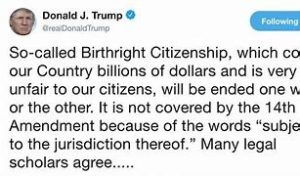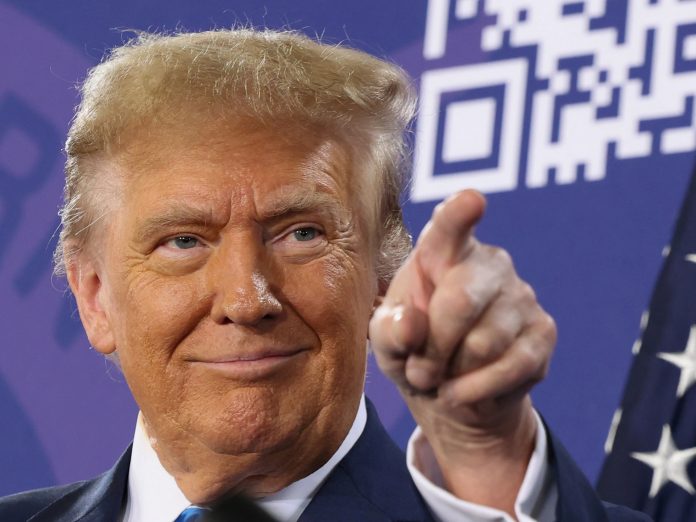
“Is a child who was born in the United States to Chinese-citizen parents who are lawful permanent residents of the United States a U.S. citizen under the Citizenship Clause of the Fourteenth Amendment?”
With Donald Trump’s recent election win, he’s back with a big plan: ending birthright citizenship. During his campaign, Trump promised to stop automatically granting U.S. citizenship to babies born in the U.S. if their parents aren’t citizens. He says he can end this with a simple executive order. But can he really change such an important part of U.S. law with just his signature? The answer is complicated—and mostly “no.” Here’s why.
First, let’s understand what birthright citizenship actually is. Under current law, if you’re born in the U.S., you’re automatically a U.S. citizen, thanks to the 14th Amendment. This rule has been in place since 1868 and was designed to make sure that everyone born here has equal rights as a U.S. citizen, no matter who their parents are or where they come from. For over 150 years, this has been a core part of what makes America a place of opportunity.
On the campaign trail, Trump repeatedly told his supporters that he’d end this practice, calling it a “magnet” for illegal immigration. He has argued he can do it on day one in office by signing an executive order. It sounds simple, but executive orders can’t override the Constitution. Changing a fundamental right like birthright citizenship isn’t something that can be done unilaterally by one person, not even the President.
 The 14th Amendment isn’t just any law; it’s part of the Constitution, which is the supreme law of the land. To change it, you’d need a constitutional amendment, and that’s no easy feat.
The 14th Amendment isn’t just any law; it’s part of the Constitution, which is the supreme law of the land. To change it, you’d need a constitutional amendment, and that’s no easy feat.
Here’s how it works: First, two-thirds of both the House and the Senate have to agree on the change, or two-thirds of the states can call for a convention (though this has never happened before). After that, three-fourths of the states—38 out of 50—must agree to the amendment for it to become part of the Constitution. The process is tough on purpose; the Founding Fathers wanted to make sure our rights couldn’t just change on a whim. An executive order doesn’t have the power to make such a massive change.
If Trump tried to end birthright citizenship by executive order, he’d face immediate legal challenges. Constitutional experts, civil rights groups, and even some politicians would take him to court. The Supreme Court has ruled in favor of birthright citizenship before, in an important 1898 case called *United States v. Wong Kim Ark*. Back then, the Court decided that a child born in the U.S. to non-citizen parents was still a U.S. citizen. If Trump issued an executive order to end birthright citizenship, it would almost certainly end up at the Supreme Court—and history suggests that the Court would likely block it.
Ending birthright citizenship would affect millions of people born in the U.S. and create massive confusion about who qualifies as a citizen. Many children born to non-citizens could be left in a legal gray area, neither fully recognized in the U.S. nor in their parents’ countries. This kind of change would be a huge departure from the American values of equality and opportunity.
“Because Wong was born in the United States and his parents were not “employed in any diplomatic or official capacity under the Emperor of China,” the Citizenship Clause of the Fourteenth Amendment automatically makes him a U.S. citizen.”
The bottom line? Trump’s goal of ending birthright citizenship would require a constitutional amendment, not just a signature on an executive order. The 14th Amendment isn’t just a rule; it’s a core part of American rights that can’t be erased without the full support of Congress and the states. So, while the debate over immigration and citizenship will keep going, actually changing the Constitution won’t be that easy.
“All persons born or naturalized in the United States, and subject to the jurisdiction thereof, are citizens of the United States and of the State wherein they reside. No State shall make or enforce any law which shall abridge the privileges or immunities of citizens of the United States; nor shall any State deprive any person of life, liberty, or property, without due process of law; nor deny to any person within its jurisdiction the equal protection of the laws.” U.S. Const. amend. XIV,
Share your story or advertise with us: Whatsapp: +2347068606071 Email: info@newspotng.com















